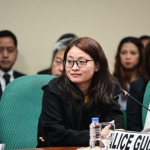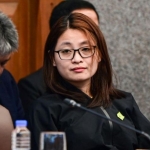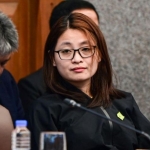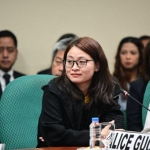
Former Bamban, Tarlac Mayor Alice Guo attended a high-profile Senate Committee on Women, Children, Family Relations, and Gender Equality hearing in Pasay City on September 9, 2024 despite growing claims she is a Chinese spy. The claims, which have grown more severe recently, highlight her alleged interaction with China’s Ministry of State Security (MSS). These assertions mostly rely on records supposedly connected to the infamous Chinese tycoon-turned-spy She Zhijiang, aggravating the already rising diplomatic and political tensions between the Philippines and China.
Explosion of Wang Fugui Testimony
The hearing revolved mostly around the testimony of former She Zhijiang partner Wang Fugui, who seemed to be offering his version digitally. Previously serving time in a Thai prison with She, Wang claimed that She had given him critical documents upon his release—files supposedly attesting to Alice Guo’s status as a spy for China’s MSS. Wang claims that Guo Hua Ping, a Chinese national with the same name flagged by the National Bureau of Investigation (NBI) during its own investigation, is Guo’s actual identity rather than that of a Filipino official. The claims have more credence as the NBI claims that fingerprints discovered on Guo match those of the Chinese national.
Wang originally became well-known in an Al Jazeera video where he disclosed She had found Alice Guo to be a spy. Wang verified these allegations during his virtual interview with Senator Risa Hontiveros, saying She had confided in him during their incarceration. “We were good friends who trusted each other and lived in prison,” Wang testified, noting She had given him important records on Guo’s activities.
Background of Alice Guo: Spy in Disguise?
Dismissed as Bamban’s mayor earlier this year, Alice Guo has consistently refuted the espionage claims, insisting she is a valid Filipino citizen. Still, the growing data points to different directions. According to Wang’s evidence, the Chinese government had been meticulously raising Guo for years; her Filipino identification was supposedly a front put on by China’s MSS to hide her actual position. Wang claims that Guo’s false identity is a weakness the intelligence agency of China has taken advantage of to control her.
Notwithstanding her protestations, the accusations have sparked fresh worries about Guo possibly being a member of a larger Chinese espionage network functioning in the Philippines. Although the Chinese Embassy in Manila has not specifically spoken anything on the matter, it has before discounted spy claims as “Sinophobic” and advised Filipinos to avoid absorbing anti-Chinese propaganda. They issued a statement earlier this year denouncing what they considered to be “false narratives,” meant to sour diplomatic ties between the two nations.
Her Part in the Spy Allegations
The core of the accusations directed against Alice Guo is her relationship with She Zhijiang, a well-known Chinese businessman who had been imprisoned on espionage charges before. She Zhijiang is well-known for his engagement in several illicit enterprises, including managing a boomtown in Myanmar named Yatai, long connected with gambling and fraud activities. She allegedly sought people like Guo to further China’s political and commercial interests overseas in this framework.
Former She cellmate Wang Fugui claimed that the MSS had conducted extensive deep penetration operations using hacking teams and local chambers of business to compile private data on Chinese nationals living overseas. According to Wang, Guo was among such those caught by the MSS. Guo Hua Ping was a spy, although not a particularly unique one. She had given Wang access to confidential papers pertaining to Guo’s espionage activities, so it just so happens there is a copy of her state security background there.
One of the most important points of Wang’s evidence was his claim that China’s MSS had set Guo’s path to become Bamban mayor. He pointed to Ma Dongli, the man Guo claimed to be her handler, the same person She contacted within the MSS. Ma, a high-ranking member of the Thai Chinese Association and American citizen, has reportedly been quite helpful in organizing intelligence activities including Guo and others around Southeast Asia.
The convoluted web of Chinese espionage
Wang’s testimony underlined the complex strategies the MSS use to underlie control and manipulation of their operatives. China’s state security, according to him, employs hacking teams and neighborhood associations to do background checks on their employees, thereby spotting flaws they might be able to leverage. For Guo, her claimed false Filipino nationality turned into a major point of leverage. “Guo Hua Ping only listens to State Security; her fake Filipino identity is such a secret and weakness,” Wang said during the hearing.
Although Wang would not say Guo’s precise role, he said that Chinese spies like her are usually assigned intelligence gathering or political and economic advancement tasks for China. According to Wang, the MSS methodically targets people with weak points and makes use of them for its operations in gathering intelligence. He said, stressing the degree of China’s clandestine operations in the area, “Her campaign itself was arranged by Chinese state security.”
Keep Reading
Senate Hearing Halved for Additional Research
Attracting a lot of media attention, the Senate hearing was momentarily delayed to enable an executive session to carry on the sensitive topic behind closed doors investigation. Among those present at the hearing were Pangasinan Mayor Liseldo Calugay, former Philippine National Police commander Benjamin Acorda Jr., and numerous people associated with the contentious Philippine Offshore Gaming Operations (POGOs). Acorda is supposed to clear his contact with Tony Yang, the brother of former Duterte government Presidential Economic Adviser Michael Yang, who has been connected to dubious POGO operations.
Guo’s case is still under review by the Senate; Hontiveros’ staff is still looking for further data and testimony. Growing conjecture as the hearing goes on suggests that the results of the inquiry might have far-reaching effects not only for Guo personally but also for the more general issue of Chinese espionage in the Philippines.
The Diplomatic Fallout with Respect to National Security Conventions
The accusations against Alice Guo coincide with a period of already high tensions between the Philippines and China, especially related to territorial conflicts in the South China Sea and the growing impact of Chinese companies in the nation. The Senate’s probe of Guo’s claimed espionage actions throws still another layer of complexity over the relationship and begs questions about China’s degree of influence inside the Philippine government.
Should the Senate’s conclusions support the suspicions that Guo is a Chinese spy, there may be major international ramifications. The case also begs urgent issues regarding the weaknesses in Philippine national security and the possible influence of Chinese citizens on the political and economic scene of the nation.
The matter is still open for now; the Senate is about to keep looking. Not just for Alice Guo but also for the future of Philippines-China ties and the continuous struggle against foreign espionage, the possible consequences of this investigation might be rather vast.




























